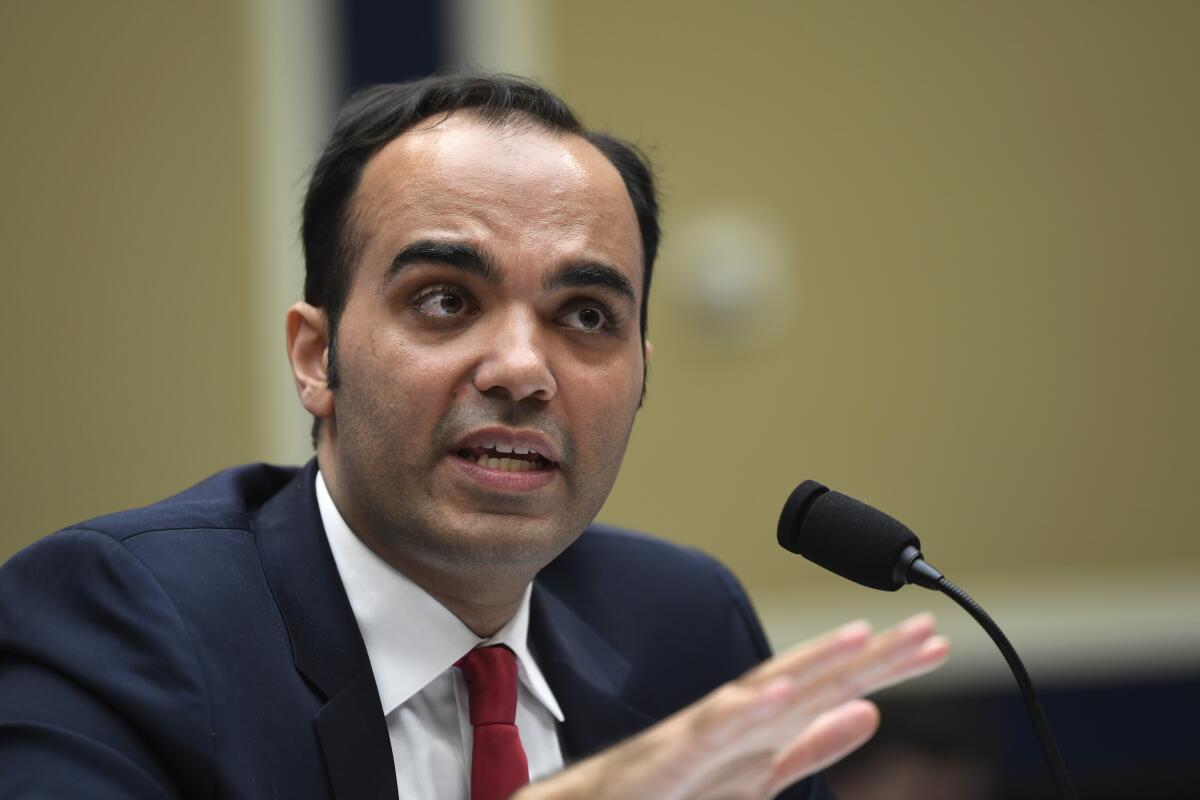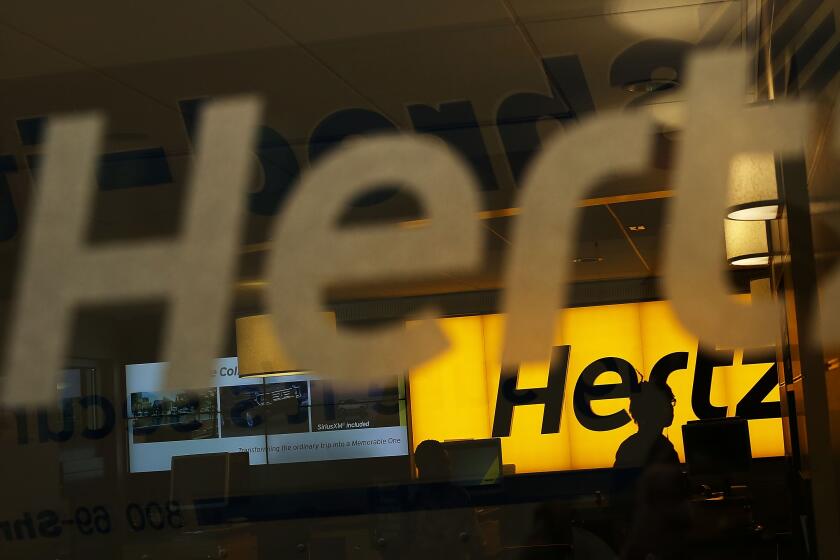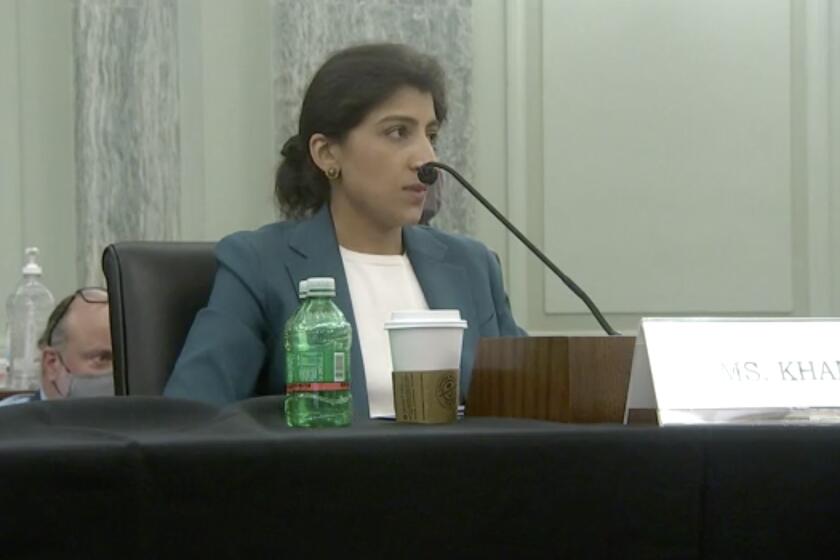Column: Businesses have been ripping off consumers for 50 years. Here’s how we can strike back

- Share via
Raise your hand if something like this has happened to you:
— You booked a hotel room, and discovered when you checked in — or checked out — that the hotel added an undisclosed daily “resort fee” to your bill, for services you never would or did use.
— You spent hours on the phone to resolve a billing dispute or complain about a damaged product, and finally gave up.
People know that the civil justice system is broken. In their daily pocketbook struggles they’re completely vulnerable.
— Consumer advocate Harvey Rosenfield
— You were part of a class-action settlement over a defective product or crooked business scheme, only to discover that you were entitled to only a few bucks and had to file a form to receive even that much.
— Your personal information was stolen by hackers from a business where you’re a customer, or even a business you didn’t have direct dealings with, exposing you to identity theft.
Get the latest from Michael Hiltzik
Commentary on economics and more from a Pulitzer Prize winner.
You may occasionally receive promotional content from the Los Angeles Times.
— You bought a bag of potato chips or box of cereal, and discovered that two-thirds of it was air.
— You were so badly mistreated by a bank or retailer that you wanted to sue, but discovered in fine print that you can only go to arbitration.
So many hands! Is there anyone in the U.S. who hasn’t experienced one or more of these indignities?
And that’s a short list of the myriad ways consumers are mistreated and abused by businesses in the U.S., with virtually no legal recourse.
“People know that the civil justice system is broken,” says Harvey Rosenfield. “In their daily pocketbook struggles they’re completely vulnerable. Most Americans have no rights or remedies.”
Rosenfield is one of our most effective consumer advocates. A former Nader’s Raider, he’s the founder of the advocacy group Consumer Watchdog and was the author of the California’s landmark Proposition 103 of 1988.
Federal law allows the government to force a huge discount on drugs it funded, but it’s hasn’t claimed its rights on the hugely expensive prostate drug Xtandi.
That ballot measure rolled back auto, property and casualty insurance rates by 20%, created the position of an elected insurance commissioner, and gave the commissioner prior approval authority over those rates.
In collaboration with consumer advocate Laura Antonini, Rosenfield has just issued a comprehensive report on how consumer rights have shrunk over the last 50 years or so, mostly due to pressure on legislators from big corporations.
The report, titled “Reboot Required,” chronicles the proliferation of legal limitations on corporate liability and corporate assaults on consumer courtroom rights, including access to class actions and the rise of forced arbitration.
As the report accurately observes, businesses’ clout in Washington has only intensified since the notorious Citizens United decision by the Supreme Court in 2010 opened the floodgates to corporate political contributions.
Rosenfield and Antonini propose a model state consumer law, the Represent Act, which would roll back these trends.
What the report’s readers will most readily recognize are its catalog of consumer ripoffs — some familiar, and some so novel that they may be invisible to most consumers.
In addition to those mentioned above, they include lying about list prices and overstating discounts; bogus claims that foods are “all-natural”; and automatic renewals of subscriptions services and obstacles to cancelations.
“These are actual issues that people deal with in everyday life,” Rosenfield told me. Deteriorating customer service is a universally experienced burden.
“The one thing that’s invaluable is your time,” he says. “Corporations recognize that people don’t have the time to engage in protracted battles with someone to resolve a billing dispute. It’s so hard to rectify a problem that at the end of the day you have to capitulate. Corporations have transferred the cost in time and money from themselves to the consumer.”
Hertz is a one-stop shop for American corporate shortcomings.
Also on the list are burdensome paperwork requirements for promised rebates; hidden charges on prepaid cards that drain their value over time; worthless product warranties; predatory bank fees on loans and accounts.
Airlines have developed a world-class expertise in hitting customers with fees for services that used to come bundled into the price of a ticket. In the U.S., fees for checked baggage are the biggest category — industrywide, those rose to nearly $5.8 billion in 2019 from $3.5 billion in 2014, a 65% increase. (They fell sharply in the pandemic-strained years 2020 and 2021.)
But travelers now routinely face charges for in-flight meals, for choosing seats before a flight, or for using the overhead luggage bin.
One deep discount carrier, Europe-based RyanAir, even contemplated charging passengers to use the bathroom in-flight, but dropped the plan after an uproar. You can be sure that if RyanAir was able to make the plan stick, it would have started to proliferate across the industry.
The authors are particularly concerned about what they call “surveillance scoring.” This is the use of secret, computerized algorithms that make assumptions about consumers that can affect their ability to land jobs, make product returns or get a loan.
These actions and policies aren’t only those of little fly-by-night operators that can’t be trusted, but of major consumer brands with premium reputations. Occasionally they get caught in the act, and have to make amends (almost always a minuscule proportion of revenues or profits).
Amazon, for instance, was fined $1.1 million by Canadian regulators in 2017 for inflating supposed customer savings by displaying inaccurate list prices, a practice exposed by Consumer Watchdog. In the U.S., customers sued, but Amazon was able to force them into arbitration and the lawsuits were dismissed.
In 2015, Volkswagen was found to have programmed its diesel vehicles to produce deceptively clean emission test results, and ordered to pay fines and penalties of $25 billion.
Facing a tough regulator for the first time, Facebook and Amazon are trying to sideline FTC Chair Lina Khan.
AT&T was discovered in 2018 to be “throttling” smartphone data speeds, slowing performance even for customers paying for unlimited data. AT&T’s settlements of a class-action lawsuit and a Federal Trade Commission complaint returned an average of $22 to consumers, even though they had been paying $30 a month for their service.
Data breaches are legion, some involving the personal information of scores or hundreds of millions of consumers, because so many companies fail to make necessary investments to protect people’s data from hackers.
The negligent companies customarily offer victims free identity theft protections, if only for limited periods, though the effectiveness of these offers is questionable.
The modern American consumer movement began with initiatives by Presidents Kennedy and Johnson and the rise to prominence of Ralph Nader in the 1960s.
Corporate America soon pushed back. Its call to arms was the so-called Powell Memorandum, written for the U.S. Chamber of Commerce by corporate lawyer Lewis Powell (who would be appointed to the Supreme Court by Richard Nixon later that year).
“The American economic system is under broad attack,” Powell wrote. He identified Nader as “the single most effective antagonist of American business, and advocated an aggressive stance by the chamber in politics, court cases, and campus speaking tours to counter critics that included “the Communists, New Leftists, and other revolutionaries who would destroy the entire system, both political and economic.”
Baggage fees, drug prices, net neutrality — Biden aims to reduce industry’s control of your daily life.
As Rosenfield and Antonini document, the chamber successfully pressed for limitations on consumer protection laws and access to the courts for consumers. Deregulation, which tended to favor industry over consumers, proceeded under Reagan and even Clinton.
Under Biden, consumers may be notching some victories. In an executive order last July, Biden took aim at a multitude of business practices that make life difficult for Americans, including high drug prices and proliferating airline fees.
The order directs federal agencies to take a closer look at proposed mergers that could drive up consumer prices and reduce consumer choice; that would be a radical and overdue reshaping of government antitrust policy.
Lina Khan, Biden’s appointee as chair of the FTC, has a strongly pro-consumer record — so much so that Amazon and Meta Platforms (formerly Facebook) have sought to have her thrown off cases the FTC has brought against them.
Under its new director, Rohit Chopra, the Consumer Financial Protection Bureau has begun to assemble a case against financial “junk fees” such as “late fees, overdraft fees, non-sufficient funds (NSF) fees, convenience fees for processing payments, minimum balance fees, return item fees, stop payment fees, check image fees, fees for paper statements, fees to replace a card” and so on.
In its request for comments, the CFPB expressed concerns that financial services companies have become addicted to an exploitative “fee economy” that costs consumers dearly.
Apple last year capitulated (up to a point) to the growing “right to repair” movement fighting product designs and corporate policies that interfere with consumers’ ability to perform repairs themselves or through their own chosen repair shops.
That brings us back to the Represent Act. If enacted by a state, the measure would require businesses such as hotels and airlines to disclose mandatory charges in the advertised price. It would ban rebates in favor of upfront price reductions.
It would ban mandatory arbitration (though if the Supreme Court rules that arbitration can’t be banned, it imposes stringent disclosure rules on companies that subject consumers to the requirement).
The law would require companies to connect callers with a human customer service representative within 10 minutes of the start of a call during normal business hours. It bans bogus discount claims and other misrepresentations of price or quality.
It would mandate that subscriptions can be canceled in the same manner as the sign-up — no requirements that customers make a call or speak to a representative, for instance.
And it would give consumers and independent repair shops the right to parts, documentation or tools needed to repair any product.
The act’s provisions might not cover the full spectrum of business-consumer relationships; the inventiveness of American businesses in their quest to keep the upper hand has been almost limitless.
But it’s a start, and would put teeth into that old slogan, so frequently disregarded, that “the customer is always right.”
More to Read
Get the latest from Michael Hiltzik
Commentary on economics and more from a Pulitzer Prize winner.
You may occasionally receive promotional content from the Los Angeles Times.















